#monopolistic practices
Video
youtube
The average American pays $11.97 more on food due to added sugar and monopolistic practices in the food industry. 🍔 Tariffs and lack of competition drive up prices more in the US than anywhere else. 🌽
#youtube#The average American pays $11.97 more on food due to added sugar and monopolistic practices in the food industry. 🍔 Tariffs and lack of com#usa#American#average American#us#suger#Tariffs
0 notes
Text
Certain cellphone plans in Western Canada are not as cheap as they were prior to the Rogers-Shaw merger, Canada's competition watchdog says.
Jeanne Pratt, the Competition Bureau's senior deputy commissioner of mergers and monopolistic practices, says the agency hasn't seen evidence showing Rogers Communications Inc. is offering comparable pricing for bundled wireless plans offered by Shaw Mobile in Alberta and British Columbia before the $26-billion takeover closed last April.
Pratt was testifying at the House of Commons industry committee on Monday along with representatives from the CRTC, as MPs study the accessibility and affordability of wireless and broadband services in Canada.
MPs on the committee sounded the alarm in January, when Rogers confirmed prices were going up by an average of $5 for wireless customers not on contract and some Bell Canada customers were also told their wireless bills were set to increase.
Continue Reading
Tagging @politicsofcanada
#cdnpoli#canada#canadian politics#canadian news#british columbia#telecommunications#technology#cell phones
82 notes
·
View notes
Text


Buren: Martin Van Buren, the eighth President of the United States, served from 1837 to 1841. His presidency was marked by economic challenges, particularly the Panic of 1837, a severe financial crisis with widespread consequences, including bank failures and unemployment. Van Buren's response to the economic downturn faced criticism, and his policies, such as the Independent Treasury System, aimed at addressing financial instability, were met with mixed success. Additionally, Van Buren grappled with the complex issue of slavery in the territories, attempting to maintain a delicate balance between northern and southern interests.
Roosevelt: Theodore Roosevelt, the 26th President of the United States, served from 1901 to 1909. His presidency was characterized by a bold and progressive approach to governance, often referred to as the "Square Deal." Roosevelt advocated for government intervention in business to curb monopolistic practices and ensure fair competition. He initiated antitrust suits against major corporations, earning a reputation as a "trustbuster." Roosevelt also championed conservation efforts, establishing national parks, monuments, and wildlife reserves. His foreign policy was marked by the construction of the Panama Canal and his mediation in the Russo-Japanese War, earning him the Nobel Peace Prize in 1906. Roosevelt's dynamic leadership style, known as the "bully pulpit," shaped the presidency as a powerful force for positive change. He left an enduring legacy as a progressive reformer, environmentalist, and advocate for social justice.
#I'm gonna keep it real this is gonna be a teddy sweep#polls#random polls#tumblr polls#tumblr poll#my polls#hyperspecific poll#poll time#random poll#us history#usa#america#politics#american history#us politics#usa politics#american politics#history
42 notes
·
View notes
Text
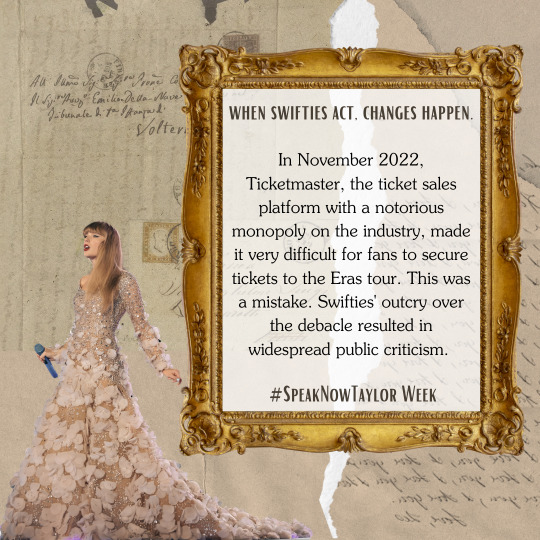
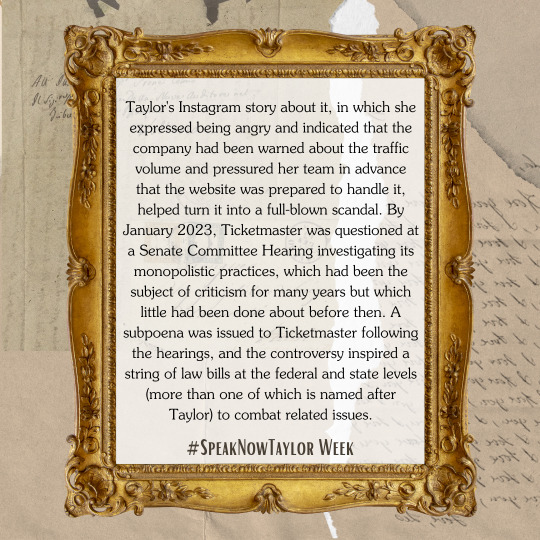
When Swifties act, changes happen.
In November 2022, Ticketmaster, the ticket sales platform with a notorious monopoly on the industry, made it very difficult for fans to secure tickets to the Eras tour. This was a mistake. Swifties' outcry over the debacle resulted in widespread public criticism. Taylor's Instagram story about it, in which she expressed being angry and indicated that the company had been warned about the traffic volume and ressured her team in advance that the website was prepared to handle it, helped turn it into a full-blown scandal. By January 2023, Ticketmaster was questioned at a Senate Committee Hearing investigating its monopolistic practices, which had been the subject of criticism for many years but which little had been done about before then. A subpoena was issued to Ticketmaster following the hearings, and the controversy inspired a string of law bills at the federal and state levels (more than one of which is named after Taylor) to combat related issues.
#speaknowtaylor#swiftiesforceasefire#swifties for palestine#taylor swift#taylorswiftedit#tsedits#taylor nation#speak now era
52 notes
·
View notes
Text
Anyone who has played the board game Monopoly is well versed in the dynamics of Success to the Successful: players who are lucky enough to land on expensive properties early in the game can buy them up, build hotels, and reap vast rents from their fellow players, thus accumulating a winning fortune as they bankrupt the rest. Fascinatingly, however, the game was originally called ‘The Landlord's Game’ and was designed precisely to reveal the injustice arising out of such concentrated property ownership, not to celebrate it.
The game's inventor, Elizabeth Magie, was an outspoken supporter of Henry George's ideas, and when she first created her game in 1903, she gave it two very different sets of rules to be played in turn. Under the 'Prosperity' set of rules, every player gained each time someone acquired a new property (echoing George's call for a land value tax), and the game was won (by all) when the player who had started out with the least money had doubled it. Under the second, ‘Monopolist’ set of rules, players gained by charging rent to those who were unfortunate enough to land on their properties and whoever managed to bankrupt the rest was the sole winner. The purpose of the dual sets of rules, said Magie, was for players to experience a practical demonstration of the present system of land grabbing with all its usual outcomes and consequences and so understand how different approaches to property ownership can lead to vastly different social outcomes. ‘It might well have been called “The Game of Life”’, remarked Magie, ‘as it contains all the elements of success and failure in the real world.’ But when the games manufacturer, Parker Brothers, bought the patent for The Landlord's Game from Magie in the 1930s, they relaunched it simply as Monopoly and provided the eager public with just one set of rules: those that celebrate the triumph of one over all.
-Kate Raworth, Doughnut Economics: Seven Ways to Think Like a 21st Century Economist
70 notes
·
View notes
Text
The Impact of Extreme Wealth on Society: Unraveling the Complex Web
In the 21st century, the issue of wealth inequality has reached unprecedented levels. The ultra-rich, a minuscule fraction of the global population, possess a staggering amount of wealth, often equivalent to that of entire countries. While wealth accumulation isn't inherently problematic, the concentration of extreme wealth in the hands of a few has far-reaching consequences for society. In this blog post, we'll explore how the ultra-rich have contributed to many of the problems we face today.
Wealth Inequality: Perhaps the most obvious consequence of extreme wealth is the exacerbation of wealth inequality. The gap between the richest and the rest has grown to alarming proportions. This inequality can lead to social unrest and hinder economic growth by limiting opportunities for the majority.
Economic Disparities: Extreme wealth often translates into disproportionate economic power. This can result in monopolistic practices, which stifle competition and innovation. Smaller businesses struggle to compete, leading to fewer choices for consumers.
Social Issues: Wealth inequality contributes to a host of social issues, including reduced access to education, healthcare, and housing for marginalized communities. It also perpetuates cycles of poverty that are difficult to escape.
Power and Influence: The ultra-rich have outsized political influence. They can shape public policies to their advantage, often at the expense of the common good. This undermines the democratic principles upon which many societies are built.
Corporate Dominance: Many of the wealthiest individuals are tied to large corporations. Their influence over these entities can lead to decisions that prioritize profits over environmental responsibility or workers' rights.
Political Lobbying: Lobbying efforts by the ultra-rich can influence legislation in their favor. This can result in tax breaks for the wealthy, further exacerbating wealth inequality.
Tax Evasion: Some of the ultra-rich engage in tax evasion schemes, depriving governments of revenue needed for essential public services. This places a heavier burden on ordinary taxpayers.
Public Policy: The ultra-rich can use their influence to push for policies that benefit them financially, such as reduced regulations or favorable trade agreements. These policies may not align with the best interests of society as a whole.
Poverty Alleviation: While philanthropy is common among the wealthy, it often falls short of addressing systemic issues. Charity, while commendable, cannot replace comprehensive government programs aimed at poverty alleviation.
Social Responsibility: Extreme wealth can lead to a detachment from the daily struggles of ordinary people. This lack of empathy can hinder efforts to address pressing social and economic challenges.
The impact of extreme wealth on society is a multifaceted issue. While it's crucial to acknowledge the positive contributions of wealthy individuals, it's equally important to scrutinize the consequences of concentrated wealth and power. Addressing these issues requires thoughtful public policy, increased transparency, and a commitment to a more equitable society. By recognizing the challenges posed by extreme wealth, we can work towards a more just and inclusive future for all.
#philosophy#epistemology#knowledge#learning#education#chatgpt#ethics#politics#economics#Wealth Inequality#Economic Disparities#Social Issues#Power and Influence#Corporate Dominance#Political Lobbying#Tax Evasion#Public Policy#Poverty Alleviation#Social Responsibility
43 notes
·
View notes
Text
tweet about how chrome is a performance hog that's killing adblockers and harvests all of your data and how its high marketshare (which is the result of anti-competitive/monopolistic practices, especially with android) allows google to uncritically invent and decide new web standards on its own because Everything Is Chrome including implementing fun new ways for ads to track you even if you disable cookies/etc: 154 rts, 704 likes
tweet that says "i hate google but you'd have to put a gun to my head before i ever switched to FIREFOX": 40,582 rts, 84,293 likes
#theres this weird internet culture where you're seen as aloof and badass and get a lot of likes#for pointing out how much you hate a website or piece of software and how it sucks#but continuing to uncritically use and give it higher marketshare/money anyway#like everyone who refuses to leave twitter because they want to “go down with the ship”#like wow you're so cool. can you go outside#i get for a lot of stuff like discord there isnt really a good alternative but for chrome?? come on
39 notes
·
View notes
Text
Journey Through the Disneyverse: The Good, the Bad and the Ugly Sides of the Mouse
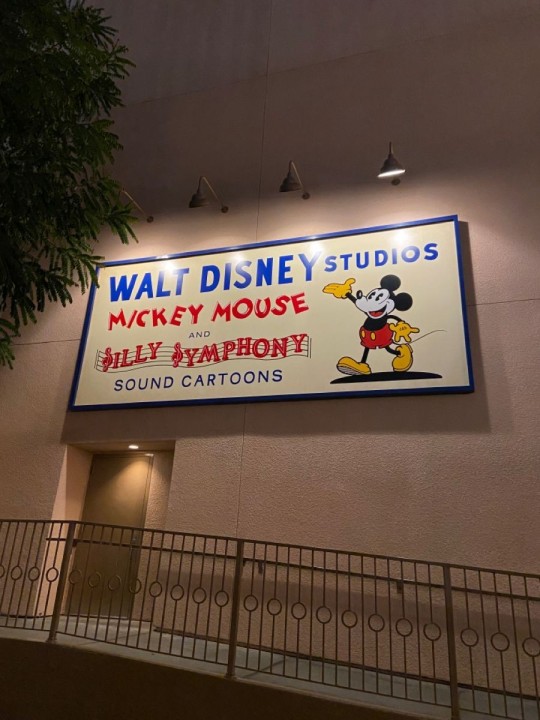
I think there aren't any companies and studios with more polarizing legacies than the ones owned by the mouse.
Defenders of Disney will paint the company as a bastion of creativity and childhood nostalgia, while haters will paint it as a symbol of greed, mindless consumerism and everything wrong with American capitalism.
The truth is much more complicated, because both sides are absolutely correct at the same time.
The company is linked with some of the best pieces of animation of all time, and with some important advances in filmmaking, technology and theme park design.
Their movies and parks are careful created gems that to this day continue to draw and enchant people, becoming part of the collective imaginary of the whole planet.
A huge chunk of Hollywood movies today wouldn't exist without Disney, because they draw heavily from films from the golden age of the studio, or from other films that tried to compete with the studio.
People call the process of sanitization of fairy tales "Disneyfication", but this is not true. This is a long process that started in the Victorian Era, and reached fairy tales that Disney itself didn't reach until the 21st century.
But Disney movies are so influential that creators can't help but draw from them, even with the threat of being sued into oblivion by the mouse.
Visual cues and story beats from animated films from their golden age keep appearing in fairy tale movies, no matter how much darker, because it now feels weird to tell a fairy tale without them.
In a way, Disney is like the modern version of Charles Perrault or the Brothers Grimm, reinventing folktales to an middle class audience, but such in a well crafted way, than the original versions are sadly forgotten.
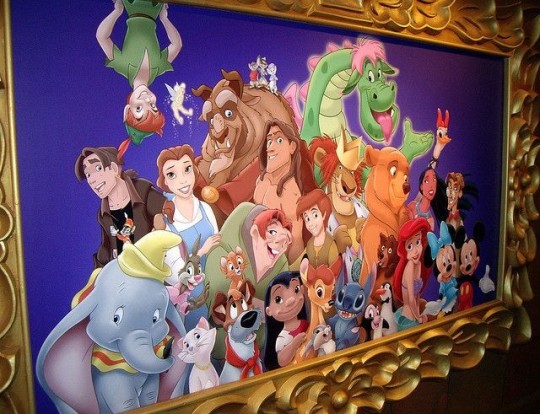
At the same the company is also linked with early cases of consumerism in Hollywood, shady and ruthless business practices, deals with undemocratic foreign powers, as well as with the lobby that killed public domain. Bob Iger also transformed the company from Hollywood powerhouse into a global monopolistic force in the last twenty years.
Disney bullies movie theater chain into showing more and more of their movies, they censorship their own films to appease China, use cheap exploited labor from China to make products . They along every single big corporation in America tries too hard to appease both sides of the political spectrum, even with the looming threat of the far right.
Is Disney wholly evil, or is the good side of it, the creative side of it, capable of redeming the bad?
I honestly don't know.
That's the downside of living under Capitalism. Everyone is corrupt, and you can't really choose much. Disney is as greed and corrupt as the rest of the Hollywood powers. As greedy as the system that created it.
All I can say is that, flowers managed to grow even among the concrete.
Even with Disney's greed, writers, animators, directors, producers, cast members, managed to create magic that surpassed generations and brought so much happiness to my childhood and many others.
Disney, as in the people that work for Disney and created the Disney brand, is magic, even if the off touch CEOs can't understand with what they are dealing with.
I can totally live with the obscene Disney Empire collapsing in the next few years. I can live with more voices and more competition in Hollywood. I CAN'T live with the Walt Disney Animation Studios or the theme parks ever closing down.
Because despite it all, they inspired me and continue inspiring me.
With Disney 100th anniversary coming soon I would like to thank all the creative forces at Disney, both credited and unfairly uncredited. Your struggles weren't in vain, and you created magic.

@tamisdava2 @ariel-seagull-wings @natache @angelixgutz @princesssarisa @adarkrainbow @thealmightyemprex @the-gentile-folklorist @the-blue-fairie @thelittlehansy
27 notes
·
View notes
Photo

[Image ID: A comic titled “The illusion of free choice” which shows a cow pondering which of two routes to take. One is labelled “buying books on amazon,” and the other, “buying books from B&N.” They both lead to the same place, which is labeled, “supporting a fuckoff huge corporation owned by multi billionaires.” /end ID.]
i feel like not enough people realize that barnes & noble is literally owned by a hedge fund, and that its monopolistic practices led directly to the shuttering of scores of independent booksellers in the 90s and 00s. in lieu of either of them, may i suggest:
thriftbooks! great for getting used books cheaply. also has a stacking rewards system which gets you free books after enough purchases
massive bookshop, my personal favorite for getting new books. run by volunteers, massive sells books at costs matching or beating big chains (whose pricing is designed to undercut the little guys). what profits they make goes to a bail fund.
your local bookstore, which you can order from on bookshop.org!
also your local library or whatever
498 notes
·
View notes
Text
John Deere's repair fake-out

Last week, a seeming miracle came to pass: John Deere, the Big Ag monopolist that — along with Apple — has led the Axis of Evil that killed, delayed and sabotaged dozens of Right to Repair laws, sued for peace, announcing a Memorandum of Understanding with the American Farm Bureau Federation to make it easier for farmers to fix their own tractors:
https://www.fb.org/files/AFBF_John_Deere_MOU.pdf
This is a move that’s both badly needed and long overdue. Deere abuses copyright law to force farmers to pay for official repairs — even when the farmer does the repair. That’s possible thanks to a practice called VIN locking, in which engine parts come with DRM that prevents the tractor from recognizing them until they pay hundreds of dollars for a John Deere technician to come to their farm and type an unlock code into the tractor’s console:
https://doctorow.medium.com/about-those-kill-switched-ukrainian-tractors-bc93f471b9c8
Like all DRM, VIN locks are covered by Section 1201 of the Digital Millennium Copyright Act (DMCA), a 1998 law that criminalizes distributing tools to bypass “access controls,” even if you do so for a lawful purpose (say, to fix your own tractor using a part you paid for). Violations of DMCA 1201 carry a penalty of 5 years in prison and a $500k fine — for a first offense.
This means that Deere owners are locked into using Deere for repairs, which also means that if Deere decides something isn’t broken, a farmer can’t get it fixed. This is very bad news indeed, because John Deere tractors are just computers in a fancy, mobile case, and John Deere is incredibly bad at digital security:
https://pluralistic.net/2021/04/23/reputation-laundry/#deere-john
That’s scary stuff, because John Deere is a monopolist, and a successful attack on the always-connected, networked tractors and other equipment it supplies to the world’s farmers could endanger the global food supply.
Deere doesn’t want to make insecure tractors, but it also doesn’t want to be embarrassed by security researchers who point out that its security is defective. Because security researchers have to bypass Deere tractors’ locks to probe their security, Deere can leverage DMCA1201 into a veto over who gets to warn the public about the mistakes it made.
It’s not just security researchers that Deere gets to gag: the company uses its repair monopoly to threaten farmers who complain about its business practices, holding their million-dollar farm equipment hostage to their silence:
https://pluralistic.net/2022/05/31/dealers-choice/#be-a-shame-if-something-were-to-happen-to-it
This all adds up to what Jay Freeman calls “felony contempt of business model,” an abuse of copyright law that allows a monopolistic corporation to reach beyond its own walls and impose its will on it customers, critics and competitors:
https://locusmag.com/2020/09/cory-doctorow-ip/
If Deere was finally suing for peace in the Repair Wars, well, that was wonderful news indeed — as I said, a seeming miracle.
But — like all miracles — it was too good to be true.
The MOU that Deere and the Farm Bureau signed is full of poison pills, gotchas, fine-print and mendacity, as Lauren Goode documents in her Wired article, “Right-to-Repair Advocates Question John Deere’s New Promises”:
https://www.wired.com/story/right-to-repair-advocates-question-john-deeres-new-promises/
For starters, the MOU makes the Farm Bureau promise to end its advocacy for state Right to Repair bills, which would create a repair system governed by democratically accountable laws, not corporate fiat. Clearly, Deere has seen the writing on the wall, after the passage in 2002 of Right to Repair laws in New York and Colorado:
https://www.eff.org/deeplinks/2022/06/when-drm-comes-your-wheelchair
These two bills broke the corporate anti-repair coalition’s winning streak, which saw dozens of state R2R bills defeated:
https://pluralistic.net/2021/05/26/nixing-the-fix/#r2r
Deere’s deal-with-the-devil is a cynical ploy to brake R2R’s momentum and ensure that any repairs are carried out on Deere’s terms. Now, about those terms…
Deere’s deal offers independent repair shops access to diagnostic tools and parts “on fair and reasonable terms,” a murky phrase that can mean whatever Deere decides it means. Crucially, the deal is silent on whether Deere will supply the tools needed to activate VIN locks, meaning that farmers will still be at Deere’s mercy when they effect their own repairs.
What’s more, the deal itself isn’t legally binding, and Deere can cancel it at any time. Once you dig past the headline, the Deere’s Damascene conversion to repair advocacy starts to look awfully superficial — and deceptive.
One person who wasn’t fooled is sick.codes, the hacker who has done the most important work on reverse-engineering Deere’s computer systems, culminating in last summer’s live, on-stage hack of a John Deere tractor at Defcon:
https://pluralistic.net/2022/08/15/deere-in-headlights/#doh-a-deere
Shortly after the announcement, Sick.codes tweeted how the fine-print in the MOU would have prevented him from doing the work he’s already done (including “a direct stab at me lol”):
https://twitter.com/sickcodes/status/1612484935495057409
As with other instances of monopolistic, corporate copyfraud — like, say, the deceptive Open Gaming License — the John Deere capitulation is really a bid to take away your rights, dressed up as a gift of more rights:
https://mostlysignssomeportents.tumblr.com/post/706163316598407168/good-riddance-to-the-open-gaming-license
[Image ID: Hieronymus Bosch's painting, 'The Conjurer.' The Conjuror's shell-game table holds a small John Deere tractor that the audience of yokels gawps at. One yokel is wearing a John Deere hat. The conjurer is holding a wrench.]
1K notes
·
View notes
Text
Back in 2022 at the annual Code Conference, where tech luminaries submit to onstage interviews, an audience member asked Apple CEO Tim Cook for some tech support. “I can’t send my mom certain videos,” he said; she used an Android device, which means she can't access Apple’s iMessage. Cook’s now-infamous response: “Buy your mom an iPhone.”
Cook’s remark and Apple’s recent decision to block the third-party app Beeper from bridging the Android-to-iMessage interoperability chasm are two of the many examples of allegedly monopolistic behavior cited in the US government’s antitrust suit against Apple. Central to the case is Apple’s practice of “locking in” iPhone customers by undermining competing apps, using its proprietary messaging protocol as glue, and generally making it challenging for people to switch to other phones.
Those accusations are backed up by lawyerly references to the Sherman Act. But the complaint also shows the Department of Justice crafting a cultural narrative, trying to tell a technology tale with a clear message—like an episode of the crime drama Dragnet, says antitrust expert William Kovacic, who teaches at George Washington University and King’s College, London.
The Apple antitrust lawsuit, filed Thursday by the DOJ and more than a dozen state attorneys general, claims that in addition to degrading the quality of third-party apps, Apple “affirmatively undermines the quality of rival smartphones.” Because messages sent between iPhones via Apple’s proprietary network appear in blue bubbles, but those from Android phones appear in green and are excluded from many iMessage features, Apple has signaled to consumers that rival phones are of less quality, the suit alleges.
The suit includes references to the negative cultural and emotional impact of the restrictiveness of some Apple products. It ranges beyond the typical antitrust case, in which investigators might focus on supracompetitive pricing or the conditions of corporate deals that restrict competition. The core of US antitrust cases has long been proving consumers paid higher prices as a result of anticompetitive practices. But a few key paragraphs within the 88-page filing mention the exclusion and social shaming of non-iPhone users confined inside green chat bubbles, distinguishing this case from some of the more recondite explanations of tech market competition in recent years.
“Many non-iPhone users also experience social stigma, exclusion, and blame for ‘breaking’ chats where other participants use iPhones,” the suit reads. It goes on to note that this is particularly powerful for certain demographics, like teenagers, who The Wall Street Journal reported two years ago “dread the ostracism” that comes with having an Android phone.
The DOJ argues that all of this reinforces the switching costs that Apple has baked into its phones. Apple is so dominant in the smartphone market not because its phones are necessarily better, the suit alleges, but because it has made communicating on other smartphones worse, thereby making it harder for consumers to give up their iPhones.
Legal experts say this social stigma argument will need much stronger support to hold up in court, because it doesn’t fit with traditional definitions of antitrust. “What is Apple actually precluding here? It’s almost like a coolness factor when a company successfully creates a network effect for itself, and I’ve never seen that integrated into an antitrust claim before,” says Paul Swanson, a litigation partner at Holland & Hart LLP in Denver, Colorado, who focuses on technology and antitrust. “This is going to be an interesting case for antitrust law.”
Regardless, the DOJ’s complaint builds a powerful message from the cacophony of consumer voices that have vented frustrations with iMessage’s lack of interoperability in recent years. And it’s part of a broader, democratizing theme introduced by Jonathan Kanter, the assistant attorney general for the DOJ’s Antitrust Division, says Kovacic, who previously served as chair of the Federal Trade Commission. “Kanter basically said, ‘We’re trying to make this body of law accessible to ordinary human beings and take it away from the technicians,’” Kovacic says. “Storytelling is overstated in some ways, but my sense is that a lot of work went into this filing.”
Apple has rejected the DOJ’s allegations. In an earlier statement to WIRED, Apple spokesperson Fred Sainz said that the lawsuit “threatens who we are and the principles that set Apple products apart in fiercely competitive markets” and added that its products work “seamlessly” together and “protect people’s privacy and security.”
Cultural arguments about the harms of the iPhone’s stickiness will resonate with a lot of consumers, even if they end up being legally indefensible. Blue bubble vs. green bubble messaging has become a much more mainstream debate that transcends the wonky, technical underpinnings of iMessage’s protocol. Apple has also consistently boasted of iPhone and iMessage’s tight security, while seemingly denying third-party apps—such as Beeper—the ability to offer a similar level of security between iPhones and Android phones.
Apple has suggested that the design of iMessage is not anticompetitive, because iPhone users can install and use any third-party messaging app they please, as long as it’s available in the App Store. Apps like Facebook Messenger, WhatsApp, and Signal can all be installed on iPhones and give messages sent from users on Android or iPhone equal treatment.
The DOJ takes aim at that, too, saying that these other apps first require opt-in from consumers on both sides of a conversation because they form closed systems of their own. And the case points out that Apple hasn’t given app developers any technical means of accessing the iPhone messaging APIs that would allow SMS-like, cross-platform, “text to anyone” functions from those apps.
Swanson says he still believes Apple has been careful to take the necessary steps to legally preserve consumer choice, which is one of the fundamental principles in US antitrust law. “You probably can’t do sophisticated messaging on a T9 phone these days,” he says, referencing the predictive text system that dominated before the iPhone popularized touchscreens. “But there are plenty of other options in the market that won’t deprive you of a network effect.”
Kovacic believes that as the case continues, the DOJ will have to bring forward new evidence and arguments to stand up the cultural aspects of its suit. That could involve tapping theories of economics and the psychology of human behavior to attempt to explain why some technology consumers may unconsciously favor certain products they are emotionally attached to. More likely, he says, the DOJ will have to present contemporaneous business notes that show Apple’s anxiety about competitive apps or emerging technologies, and how the company responded in apparently dubious ways.
One way the DOJ tries to stand up its allegations is by comparing Apple to an earlier antitrust target: Microsoft. In a historic antitrust case filed in 1998, the DOJ presented evidence that Bill Gates’ company was fearful that software like the Netscape browser could weaken the market power of Windows, Kovacic says.
Steven Sinofsky, a former longtime Microsoft executive, wrote in a highly charged blog post on Saturday that he suspects many of the suit’s arguments about Apple’s products will prove to be irrelevant. “Almost all of the [DOJ-Apple] battles will end up being about the terms and conditions of contracts which is the stuff lawyers and courts are good at, and not on product design,” he wrote. “The vast majority of the settlement in the Microsoft case ended up being terms and conditions licensing Windows.”
In other words, the DOJ has shown some of its cards in this initial complaint—and told a story that will resonate with many frustrated smartphone users. But to keep the case alive the agency will have to present additional, concrete, evidence that Apple’s anxieties about its products being devalued led it to act in ways that caused actual harm. If the DOJ wants to make the case against Apple as historic as the one against Microsoft it will have to prove, as Kovacic puts it, “that the anecdotes aren’t just storytelling.”
7 notes
·
View notes
Note
I'm not sure what's worse, the UFC's absolute scumbag business practices or the fans who bend over backwards trying to defend Dana and Co. well also trashing every single fighter. I hardly engage with the online MMA community anymore because of people like that. (All this in reference to that O'Malley article)
Everything just sucks. @thesportssoundoff used to say it all the time but the UFC business model is basically aped from the WWE, a monopolistic company where one ego maniacal, extremely reactionary and spiteful man basically got to control and shape the entire business for decades. So this is the result you get when you copy and paste that model to a competitive sport. And that man (Vince) also has fans who defend his every action because it was for “the good of the company, and therefore the sport.”
And honestly, that’s everything nowadays. People are so fucking addicted to brands they’ll brush off every terrible action from a company if they get their hit of dopamine at the end. Video games companies, clothing brands, sports teams, Elon musk for some reason. Bunch of weirdos.
One of the things that stopped me from burning out on the sport years ago was just to stop going to sites like UG and Sherdog. Some great posters on their but too many status quo warriors and tribalist weirdos.
17 notes
·
View notes
Text
It's kind of hard to take seriously things like "this celebrity did/said this awful thing so we don't support them" when the thing in question is like, extremely trendy front-page news that everyone's talking about. Like, there's a list going around right now naming and shaming famous people posting in support of Israel, and the thing is you just know 90% of these people have no fucking idea what they're talking about. They've never thought twice about Israel or Palestine except maybe in terms of booking a concert in Tel Aviv, they certainly don't know about the history, and there's a decent chance half of them don't even know what Palestine is. They just checked their phones one evening, saw a million news articles all unilaterally declaring that the gentle and innocent people of Israel were being randomly bombarded by the cruel, twisted barbarians of Palestine and didn't bother looking for context before hopping on Instagram to share the exact same post five thousand other celebrities were all sharing. Then they all went back to their days, not even glancing at the replies because they have managers for that (and realistically, their managers probably told them what to post in the first place too).
If it's something like Kanye randomly going neo-Nazi or Gal Gadot actively using her celebrity to promote the IDF or Depp publicly plotting to ruin his victim's life because she spoke against him, then yeah, hold that grudge, because those people are assholes entirely of their own volitions. But like, what's the point in moralizing things like "this artist is doing NFTs even though they destroy the environment" or "this influencer is mourning Queen Elizabeth despite her being a murderous colonizer" or "this actor is endorsing Amazon despite their monopolistic and abusive business practices"? None of these people know anything beyond what NBC tells them and very few of them would care if they did. They're literally just posting whatever will make them more popular, and unfortunately that usually involves godawful political stances.
#pepperpost#this probably sounds angrier than it is#i'm not trying to vague i'm just exhausted seeing people put so much energy into caring what celebrities think#especially because celebrities usually don't think
10 notes
·
View notes
Text

Είναι καλή αφορμή η σημερινή Ημέρα Ελληνικής Γλώσσας για να θυμηθεί κανείς τις ιστορικές ομιλίες του οικονομολόγου και πολιτικού Ξενοφώντα Ζολώτα στα τέλη της δεκαετίας του 1950 στα αγγλικά, αρθρωμένες σχεδόν εξ ολοκλήρου με λέξεις και φράσεις ελληνικής προέλευσης.
Χρειάζεται βαθιά και ουσιαστική κατανόηση τόσο της ελληνικής όσο και της αγγλικής γλώσσας για να μπορέσει κανείς να γράψει και να εκφωνήσει όχι έναν, αλλά δυο τέτοιους λόγους.
Χρειάζεται και ένα δυνατό κίνητρο, ένας λόγος. Ποιος ήταν αυτός; Σύμφωνα με τον Ν. Σαραντάκο, δεν ήταν κάποια ιδεολογική εμμονή εθνικο-πατριωτικού χαρακτήρα στην ελληνική γλώσσα. Ήταν μια σαφής πολιτική κίνηση: να στρέψει το ενδιαφέρον της διεθνούς κοινής γνώμης στη βαθιά λαβωμένη από τον εμφύλιο πόλεμο, Ελλάδα. Οι λόγοι εκφωνήθηκαν στο πλαίσιο των ετήσιων συναντήσεων της Παγκόσμιας Τράπεζας.
Η πρώτη ομιλία έγιν�� το 1957 και προκάλεσε τόσο ενθουσιασμό που μετά από απαίτηση του επικεφαλής της διεθνούς Τράπεζας, επαναλήφθηκε παρόμοια ομιλία το 1959.
Το κείμενο της πρώτης ομιλίας, αφού ενημέρωσε το κοινό για το εγχείρημα του, προκείμενου να τραβήξει την προσοχή τους, είναι το εξής:
Kyrie,
I eulogize the archons of the Panethnic Numismatic Thesaurus and the Ecumenical Trapeza for the orthodoxy of their axioms, methods and policies, although there is an episode of cacophony of the Trapeza with Hellas.
With enthusiasm we dialogue and synagonize at the synods of our didymous Organizations in which polymorphous economic ideas and dogmas are analyzed and synthesized. Our critical problems such as the numismatic plethora generate some agony and melancholy.
This phenomenon is characteristic of our epoch. But, to my thesis, we have the dynamism to program therapeutic practices as a prophylaxis from chaos and catastrophe. In parallel, a panethnic unhypocritical economic synergy and harmonization in a democratic climate is basic. I apologize for my eccentric monologue. I emphasize my eucharistia to you Kyrie, to the eugenic and generous American Ethnos and to the organizers and protagonists of this Amphictyony and the gastronomic symposia.
Το κείμενο της δεύτερης ομιλίας είναι το ακόλουθο:
Kyrie,
It is Zeus’ anathema on our epoch and the heresy of our economic method and policies that we should agonize the Skylla of nomismatic plethora and the Charybdis of economic anaemia.
It is not my idiosyncracy to be ironic or sarcastic but my diagnosis would be that politicians are rather cryptoplethorists. Although they emphatically stigmatize nomismatic plethora, they energize it through their tactics and practices. Our policies should be based more on economic and less on political criteria. Our gnomon has to be a metron between economic strategic and philanthropic scopes.
In an epoch characterized by monopolies, oligopolies, monopolistic antagonism and polymorphous inelasticities, our policies have to be more orthological, but this should not be metamorphosed into plethorophobia, which is endemic among academic economists.
Nomismatic symmetry should not antagonize economic acme. A greater harmonization between the practices of the economic and nomismatic archons is basic.
Parallel to this we have to synchronize and harmonize more and more our economic and nomismatic policies panethnically. These scopes are more practicable now, when the prognostics of the political end economic barometer are halcyonic.
The history of our didimus organization on this sphere has been didactic and their gnostic practices will always be a tonic to the polyonymous and idiomorphous ethnical economies. The genesis of the programmed organization will dynamize these policies.
Therefore, I sympathize, although not without criticism one or two themes with the apostles and the hierarchy of our organs in their zeal to program orthodox economic and nomismatic policies.
I apologize for having tyranized you with my Hellenic phraseology. In my epilogue I emphasize my eulogy to the philoxenous aytochtons of this cosmopolitan metropolis and my encomium to you Kyrie, the stenographers.
Με δεδομένο το υψηλό επίπεδο του κοινού στο οποίο απευθυνόταν ο Ξενοφών Ζολώτας, το εγχείρημα ήταν εξαιρετικά εύστοχο και αντάξιο της διάνοιας για την οποία φημιζόταν ο ίδιος. Οι λόγοι του είναι κάθε άλλο παρά κενοί περιεχομένου, ενώ ταυτόχρονα έχουν ύφος εύστοχο και πνευματώδες, καθώς θίγει σημαντικά οικονομικά ζητήματα. Στην πρώτη ομιλία ζητεί διεθνή εναρμόνιση και συνέργειες για την καταπολέμηση του πληθωρισμού, ενώ στη δεύτερη περιγράφει γλαφυρά τα προβλήματα που αναδύονται από την ταυτόχρονη συνύπαρξη «της Σκύλλας του πληθωρισμού και της Χάρυβδης της οικονομικής ύφεσης». Δείτε στο τέλος της δεύτερης ομιλίας ότι δεν παραλείπει να μνημονεύσει ακόμη και τους στενογράφους που θα βασανίζονταν ατελείωτα να καταγράψουν τον λόγο του.
Η λέξη «stenographer» εξ άλλου είναι κι αυτή ελληνική!
Daily inspiration. Discover more photos at Just for Books…?
5 notes
·
View notes
Text
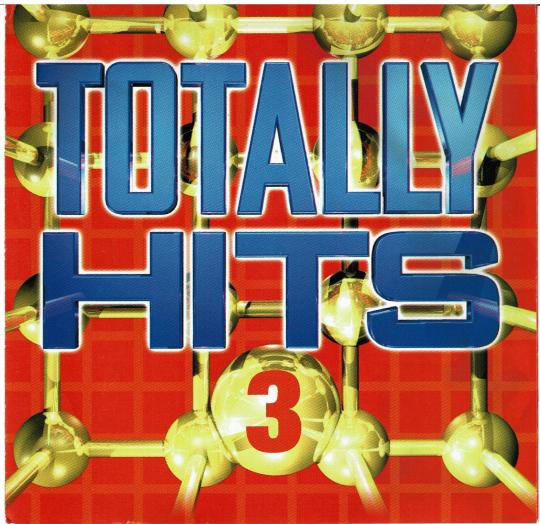
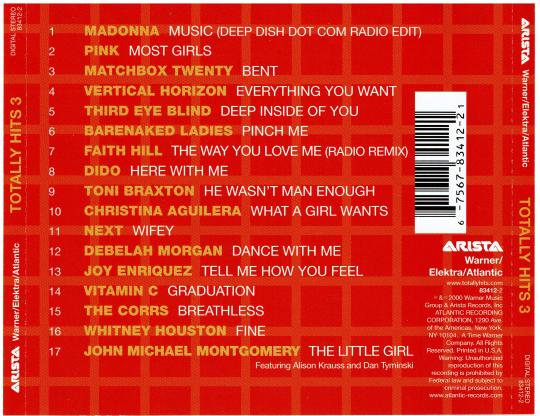
Today's compilation:
Totally Hits 3
2000
Alternative Rock / Pop-Rock / Pop / R&B / Adult Contemporary / Teen Pop
Time for yet another fun turn-of-the-millennium trip down memory lane, folks! Yesterday we got into a dispatch from America's bestselling contemporary hits series, Now That's What I Call Music!, but today we've got something from what was once their greatest competitor instead: Totally Hits.
And the biggest difference between these two series was ultimately the partnerships between the labels that put them out: the US version of Now was the result of a link-up between Capitol, EMI, Universal, Virgin, and their many subsidiaries, and Totally Hits represented Sony, BMG, Warner, Elektra, Atlantic, and their many subsidiaries. Now always wound up having the upper hand with the more popular collective catalog, but Totally Hits wasn't any slouch, either, even if they were Now's perpetual kid sister.
So, here we have a pretty solid collection of late 90s and early 2000s commercial fare that should provide for a nice nostalgia rush, but the most glaring omission on this third Totally Hits installment is that there aren't any boy bands at all. And that's because, by the time this album had come out, NSYNC—who had made an appearance on the prior volume—had successfully left their label, RCA, citing the glaring and overt exploitative practices of their manager, Lou Pearlman. And as a result, at the height of the teen pop explosion, the massive conglomerate that made up Totally Hits only had acts like Christina Aguilera and Vitamin C to show for it, whereas Now, with Jive Records appearing to fall under their umbrella, had not only NSYNC, but also the Backstreet Boys and Britney Spears as well. And as a result, Totally Hits suffered because of it.
youtube
But TH wasn't to be totally ignored, because their releases still had plenty of good pop music on them, and although they may have faltered in the teen pop arena, where they seemed to make up for it was in alternative pop-rock and R&B, with late 90s-early 00s entities like Matchbox Twenty, Barenaked Ladies, and Third Eye Blind holding down the rock side of things, while dominant forces like Whitney Houston and Toni Braxton were able to supply some of the quality R&B.
And another dimension that Totally Hits had that Now really didn't was country. I might dislike the pair of tunes that TH selected here for this album, between Faith Hill's super poppy "The Way You Love Me,“ and John Michael Montgomery's eyeroll-inducing and deeply Christian-overtoned "The Little Girl," but including a very popular genre that Now wasn't paying much of any mind to at all definitely helped Totally Hits to differentiate themselves.
So, I'd expect a lot of people to be familiar with most of these songs, but two that I'd like to point out especially are Dido's "Here With Me" and Next's "Wifey." Both of these acts each had a hit that was far more popular than the one that ended up on this album—Dido's "Thank You," which was also liberally sampled for Eminem's "Stan," and Next's "Too Close," a #1 hit song about trying to suppress an erection while grinding on someone 😂. But "Here With Me," which was actually Dido's debut single, is a beautiful piece of tender female singer-songwriter pop, and "Wifey," the lead single off of Next's sophomore album, is a terrific slice of dreamy and softly funky male group R&B.
So if you're ever trying to piece together an eclectic representation of a turn-of-the-millennium American commercial pop music landscape, Now is, of course, essential, but it'd be foolish to sleep on what Totally Hits had to offer, because while Now was definitely better, they weren't monopolistic, and TH was there to capitalize on that circumstance.
Highlights:
Pink - "Some Girls"
Matchbox Twenty - "Bent"
Vertical Horizon - "Everything You Want"
Third Eye Blind - "Deep Inside of You"
Barenaked Ladies - "Pinch Me"
Dido - "Here With Me"
Toni Braxton - "He Wasn't Man Enough"
Christina Aguilera - "What a Girl Wants"
Next - "Wifey"
Vitamin C - "Graduation"
The Corrs - "Breathless"
Whitney Houston - "Fine"
#alternative rock#alternative#alternative music#alt rock#alt#alt music#pop rock#pop#rock#r&b#r & b#adult contemporary#teen pop#music#90s#90s music#90's#90's music#2000s#2000s music#2000's#2000's music#00s#00s music#00's#00's music#Youtube
9 notes
·
View notes
Text
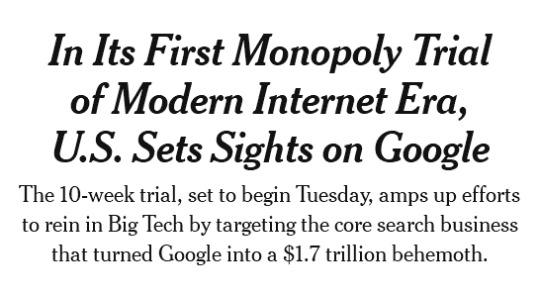
“Two decades ago, Google became the darling of Silicon Valley as a scrappy start-up with an innovative way to search the emerging internet,” the Justice Department said in its lawsuit. “That Google is long gone.”
please kill g**gle
(they will never kill g**gle)
In Its First Monopoly Trial of Modern Internet Era, U.S. Sets Sights on Google
The Justice Department has spent three years over two presidential administrations building the case that Google illegally abused its power over online search to throttle competition. To defend itself, Google has enlisted hundreds of employees and three powerful law firms and spent millions of dollars on legal fees and lobbyists.
On Tuesday, a judge in U.S. District Court for the District of Columbia will begin considering their arguments at a trial that cuts to the heart of a long-simmering question: Did today’s tech giants become dominant by breaking the law?
The case — U.S. et al v. Google — is the federal government’s first monopoly trial of the modern internet era, as a generation of tech companies has come to wield immense influence over commerce, information, public discourse, entertainment and labor. The trial moves the antitrust battle against those companies to a new phase, shifting from challenging their mergers and acquisitions to more deeply examining the businesses that thrust them into power.
Such a consequential case over tech power has not unfolded since the Justice Department took Microsoft to court in 1998 for antitrust violations. But since then, companies like Google, Apple, Amazon and Meta, which owns Facebook and Instagram, have woven themselves into people’s lives to an even greater degree. Any ruling from the trial could have broad ripple effects, slowing down or potentially dismantling the largest internet companies after decades of unbridled growth.
The stakes are particularly high for Google, the Silicon Valley company founded in 1998, which grew into a $1.7 trillion giant by becoming the first place people turned to online to search the web. The government has said in its complaint that it wants Google to change its monopolistic business practices, potentially pay damages and restructure itself.
“This is a pivotal case and a moment to create precedents for these new platforms that lend themselves to real and durable market power,” said Laura Phillips-Sawyer, who teaches antitrust law at the University of Georgia School of Law.
The case centers on whether Google illegally cemented its dominance and squashed competition by paying Apple and other companies to make its internet search engine the default on the iPhone as well as on other devices and platforms.
In legal filings, the Justice Department has argued that Google maintained a monopoly through such agreements, making it harder for consumers to use other search engines. Google has said that its deals with Apple and others were not exclusive and that consumers could alter the default settings on their devices to choose alternative search engines.
Google has amassed 90 percent of the search engine market in the United States and 91 percent globally, according to Similarweb, a data analysis firm.
Fireworks are expected at the trial, which is scheduled to last 10 weeks. Google’s chief executive, Sundar Pichai, as well as executives from Apple and other tech companies will probably be called as witnesses.
Judge Amit P. Mehta, who was appointed by President Barack Obama in 2014, is presiding over the trial, which will not have a jury, and he will issue the final ruling. Kenneth Dintzer, a 30-year veteran litigator for the Justice Department, will lead the government’s arguments in the courtroom, while John E. Schmidtlein, a partner at the law firm Williams & Connolly, will do the same for Google.
The jockeying over the trial has already been intense. The Justice Department and Google have deposed more than 150 people for the case and produced more than five million pages of documents. Google has argued that Jonathan Kanter, the Justice Department’s head of antitrust, is biased because of his earlier work as a private lawyer representing Microsoft and News Corp. The Justice Department has accused Google of destroying employees’ instant messages that could have contained relevant information for the case.
Kent Walker, Google’s president of global affairs, said in an interview last month that the company’s tactics were “completely lawful” and that its success “comes down to the quality of our products.”
“It’s frustrating — maybe it’s ironic — that we’re seeing this backward-looking case and really unprecedented, forward-looking innovation,” he said.
The Justice Department declined to comment.
Google’s search engine was created by Sergey Brin and Larry Page when they were students at Stanford University in the 1990s. Their technology was widely praised for serving up more relevant results than other web search tools. Google eventually parlayed that success into new business lines including online advertising, video streaming, maps, office apps, driverless cars and artificial intelligence.
Rivals have long accused Google of brandishing its power in search to suppress competitors’ links to travel, restaurant reviews and maps, while giving greater prominence to its own content. Those complaints brought scrutiny from regulators, though little action was taken.
In 2019, under President Donald J. Trump, the Justice Department and the Federal Trade Commission decided to mount new antitrust investigations into tech companies as part of a broad crackdown. The Justice Department agreed to oversee inquiries into Apple and Google.
In October 2020, the government sued Google for abusing its dominance in online search. In its lawsuit, the government accused Google of hurting rivals like Microsoft’s Bing and DuckDuckGo by employing agreements with Apple and other smartphone makers to become the default search engine on their web browsers or be preinstalled on their devices.
“Two decades ago, Google became the darling of Silicon Valley as a scrappy start-up with an innovative way to search the emerging internet,” the Justice Department said in its lawsuit. “That Google is long gone.”
Google’s actions had harmed consumers and stifled competition, the agency said, and could affect the future technological landscape as the company positioned itself to control “emerging channels” for search distribution. The agency added that Google had behaved similarly to Microsoft in the 1990s, when the software giant made its own web browser the default on the Windows operating system, crushing competitors.
A group of 35 states, Guam, Puerto Rico and the District of Columbia also filed a lawsuit in 2020 accusing Google of abusing its monopoly in search and search advertising to illegally wedge out competitors. That case will be tried alongside the Justice Department lawsuit, though Judge Mehta threw out many of the states’ key arguments in a ruling last month.
In January, the Justice Department filed a separate antitrust suit against Google, accusing it of abusing its monopoly power in advertising technology. The company faces two other lawsuits from states that accused it of abusing monopolies in ad tech and for blocking competition in its Google Play app store.
For decades, judges have generally ruled against companies in antitrust cases only when their conduct hurts consumers, particularly if they have raised prices. Critics have said that lets companies like Google — which provides internet search for free — off the hook.
Google’s Mr. Walker said the case was a moment for the court to double down on that standard.
“American law should be about promoting benefits for consumers,” he said, adding: “If we move away from that and make it harder for companies to provide great goods and services for consumers, that’s going to be bad for everyone.”
Monopoly trials can change the direction of industries. In 1984, under pressure from the Justice Department, AT&T split itself into seven regional telecom companies. The breakup transformed the telecommunications industry by making it more competitive at the dawn of the mobile phone era.
But the effects of the government’s antitrust battle with Microsoft in the early 2000s were less clear cut. The two sides eventually settled after Microsoft agreed to end certain contracts with PC makers that blocked rival software makers.
Some tech executives said the Justice Department’s actions made Microsoft more cautious, clearing the way for start-ups like Google to compete in the next era of computing. Bill Gates, a Microsoft founder, has blamed the hangover from the antitrust suit for the company’s slow entry into mobile technology and the failure of its Windows phone. But others have argued that the settlement did little to increase competition.
Ultimately, the Google trial will test whether antitrust laws written in 1890 to break up sugar, steel and railroad monopolies can still work in today’s economy, said Rebecca Allensworth, a professor at Vanderbilt University’s law school.
“The Google trial is a big test for the government’s entire antitrust agenda because its theory of monopolization is very much in play with many big tech companies,” she said.
16 notes
·
View notes